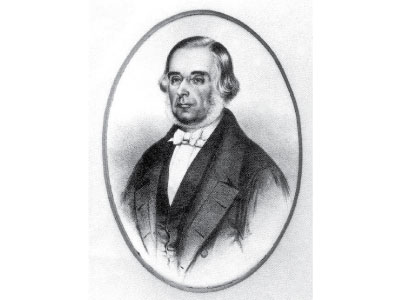Richard Hornsby (1790-1864)
IF anyone is entitled to be called the Father of Grantham, it is Richard Hornsby.
Without him, Grantham could have remained a sleepy market town in the Witham Valley instead of the dynamic engineering centre it became.
Born in Elsham, near Brigg, he became a bound apprentice to wheelwright William Harrocroft, at Barnetby-le-Wold.
He was a sickly youth and Mr Harrocroft once said: “He looked far more like filling a coffin than making one.”
After completing his indentures five years later, fate brought him to Grantham where he joined Richard Seaman’s smithy at Barrowby.
They moved to Spittlegate by the side of the Great North Road, and by 1815 they became partners producing horse threshing machines.
In 1828, Seaman retired and the company became Richard Hornsby and Co.
The tiny village of Spittlegate – south of St Catherine’s Road and Wharf Road – became a boom town, with his brick built factories springing up on both sides of London Road employing more than 500 people and builders flat-out erecting homes for the ever-growing number of employers.
He wasn’t so much an inventor as an improver.
He looked at the agricultural market and saw some poorly designed equipment.
He had repaired many of them in his youth and found them wanting.
So he turned out quality goods which improved both tilling and harvesting across the world.
It was his products which helped turn Lincolnshire’s fens and heathlands into some of the country’s most profitable farmland.
He was no speculator; instead he ensured there was an unmistakable demand before embarking on any new product.
His Warwick plough with a revolutionary convex breast became the blueprint for all other manufacturers, and when steam became the fashion he looked at the opposition first before producing his own highly successful portable engine.
He was described as “a man of thorough and incorruptible integrity with the goods he made as honest as himself.”
Yet he was a simple and true-hearted man.
A devout Wesleyan, he was a good employer who respected his men who in turn respected him although he was strict on timekeeping and morality.
He lived by high moral standards and expected no less from those who worked for him.
When he died aged 74 at home following a long illness, the population of Spittlegate was more than 5,000, compared with 450 when he set up his business.
Not only did thousands benefit through jobs he created, but his legacy was to give Grantham the reputation of having some of the world’s finest engineers, which in turn attracted other plant making companies for more than a century.
The company was taken over by Richard Jnr, William and James and continued to grow, successfully developing the compression engine and track vehicles as well as the world’s first diesel tractor.
In 1918 the company merged with Ruston, Proctor & Co of Lincoln, to become Ruston and Hornsby.


Leave a Reply
You must be logged in to post a comment.